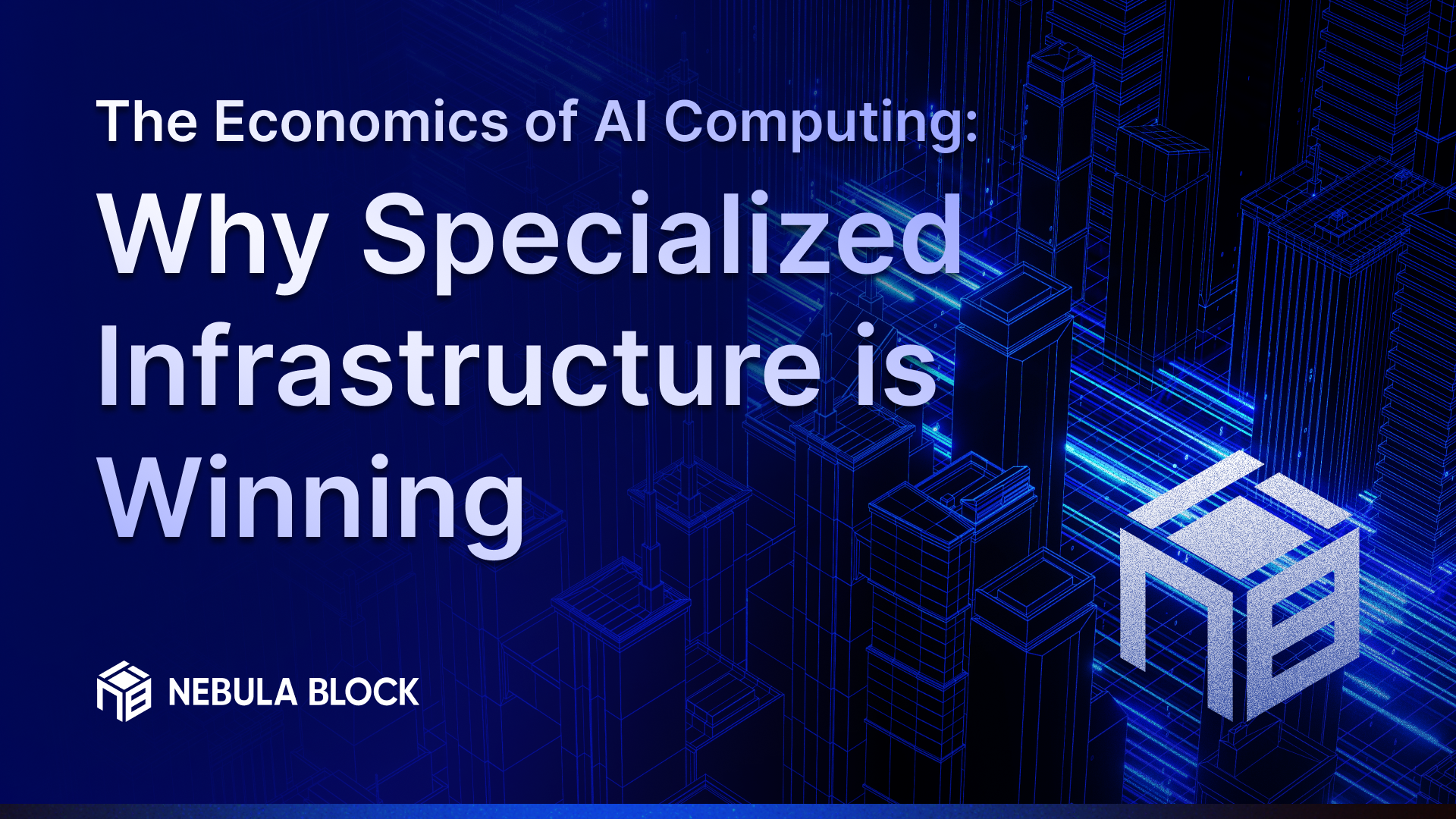The Economics of AI Computing: Why Specialized Infrastructure is Winning

The AI infrastructure landscape is undergoing a fundamental transformation. As AI workloads become increasingly diverse and specialized, the economic equation driving infrastructure decisions is shifting dramatically. This analysis examines the market forces reshaping AI computing economics and explains why specialized infrastructure providers are gaining momentum against general-purpose cloud offerings.
The Shifting Economics of AI Compute
Historical Context: Cloud Dominance
For much of the past decade, major cloud providers dominated AI infrastructure through economies of scale and convenience. Their value proposition was clear:
- Simplified access to GPU resources
- Minimal upfront investment
- Ecosystem integration advantages
The New Economic Reality
Our analysis of current market data reveals five factors driving the economic shift toward specialized infrastructure:
1. Workload Optimization Premium
General-purpose cloud GPU instances typically achieve only 40–60% of theoretical performance for specific AI workloads. Specialized infrastructure optimized for particular model architectures demonstrates 80–95% efficiency, effectively providing nearly 2x more compute per dollar.
This optimization advantage is exemplified by platforms like Nebula Block, which delivers cutting-edge hardware includingz specifically configured for AI training and inference workloads.

2. Scale Pricing Dynamics
While cloud providers offer economies of scale, their pricing models still include significant margins at every tier. Based on publicly available pricing data and industry case studies, specialized infrastructure providers appear to offer competitive cost advantages for large-scale AI workloads, though specific savings vary significantly based on workload characteristics, utilization patterns, and deployment scale.
[Note: Specific cost comparisons should be validated with current pricing data from relevant providers.]
3. The Hidden Costs of Data Gravity
Cloud providers’ data transfer fees create substantial hidden costs for AI workloads that process large datasets. A typical computer vision training job processing 500TB of data can incur $50,000+ in data transfer costs alone — a charge entirely absent in specialized infrastructure with co-located storage.

Specialized providers address this challenge through integrated storage architectures. Nebula Block’s S3-compatible object storage seamlessly integrates with computing services, eliminating the data transfer fees. This integration represents a fundamental architectural advantage that specialized providers can deliver.

Market Implications
This evolving economic landscape is creating several notable market trends:
1. The Rise of Vertical Specialization
Infrastructure providers are increasingly focusing on specific AI workload types:
- Large language model inference optimization
- Vision model training acceleration
- Multimodal AI deployment architectures
This specialization trend is demonstrated by Nebula Block, which offers distinct service tiers tailored to different AI development phases: serverless endpoints for model experimentation and prototyping, on-demand GPU instances for intensive training workloads, and integrated storage solutions for comprehensive AI development lifecycles. Rather than attempting to serve all computing needs, these specialized providers optimize their entire stack for AI-specific requirements.

2. Hybrid Deployment Strategies
Enterprise organizations are developing sophisticated hybrid approaches:
- Core training on specialized infrastructure
- Prototype development on general-purpose cloud
- Edge inference on optimized specialized hardware
3. The Ecosystem Value Premium
Nebula Block is building comprehensive ecosystems that include:
- Optimized software stacks
- Model deployment pipelines
- Specialized monitoring and management tools
The ecosystem approach distinguishes successful specialized providers from simple hardware resellers. Platforms that offer fully customizable computing environments with comprehensive AI framework compatibility, like those provided by leading specialized infrastructure companies, deliver value beyond raw compute resources by reducing integration complexity and operational overhead.
Looking Ahead: The Emergence of AI-Native Infrastructure
The transformation we’re witnessing represents more than incremental improvement — it signals the emergence of truly AI-native infrastructure. Nebula Block exemplify this evolution, having built their platforms from the ground up specifically for AI workloads rather than retrofitting general-purpose infrastructure.
This AI-native approach manifests in several ways:
- Hardware Selection: Curating GPU options specifically for different AI workload profiles rather than offering generic compute instances
- Pricing Models: Usage-based billing that aligns with AI development patterns rather than traditional server rental models
- Integration Philosophy: Native compatibility with AI frameworks and tools rather than requiring complex configuration
- Service Architecture: Designing services around AI development workflows rather than general computing patterns
The economic advantages of this approach become clear when organizations can focus entirely on their AI development goals rather than wrestling with infrastructure complexity and costs designed for different use cases.
Conclusion
The economics of AI computing have fundamentally changed. While general-purpose cloud infrastructure remains valuable for many use cases, organizations with substantial and specific AI workloads are increasingly finding compelling economic advantages in specialized infrastructure. This trend will accelerate as AI becomes more deeply embedded in core business operations and the economic stakes of infrastructure efficiency continue to rise.
The emergence of specialized AI infrastructure providers, Nebula Block represents not just a market opportunity, but a necessary evolution in response to the unique economic and technical requirements of AI workloads. These platforms demonstrate that purpose-built infrastructure can deliver both superior performance and dramatically improved economics compared to adapted general-purpose solutions.
Stay Connected
💻 Website: nebulablock.com
📖 Docs: docs.nebulablock.com
🐦 Twitter: @nebulablockdata
🐙 GitHub: Nebula-Block-Data
🎮 Discord: Join our Discord
✍️ Blog: Read our Blog
📚 Medium: Follow on Medium
🔗 LinkedIn: Connect on LinkedIn
▶️ YouTube: Subscribe on YouTube